- LanguageAfrikaans Argentina AzÉrbaycanca
á¥áá áá£áá Äesky Ãslenska
áá¶áá¶ááááá à¤à¥à¤à¤à¤£à¥ বাà¦à¦²à¦¾
தமிழ௠à²à²¨à³à²¨à²¡ ภาษาà¹à¸à¸¢
ä¸æ (ç¹é«) ä¸æ (é¦æ¸¯) Bahasa Indonesia
Brasil Brezhoneg CatalÃ
ç®ä½ä¸æ Dansk Deutsch
Dhivehi English English
English Español Esperanto
Estonian Finnish Français
Français Gaeilge Galego
Hrvatski Italiano Îλληνικά
íêµì´ LatvieÅ¡u Lëtzebuergesch
Lietuviu Magyar Malay
Nederlands Norwegian nynorsk Norwegian
Polski Português RomânÄ
Slovenšcina Slovensky Srpski
Svenska Türkçe Tiếng Viá»t
Ù¾Ø§Ø±Ø³Û æ¥æ¬èª ÐÑлгаÑÑки
ÐакедонÑки Ðонгол Ð ÑÑÑкий
СÑпÑки УкÑаÑнÑÑка ×¢×ר×ת
اÙعربÙØ© اÙعربÙØ©
Home / Albums / Tags arrest + police
+ police 14
14
Creation date / 2013 / जुलाय

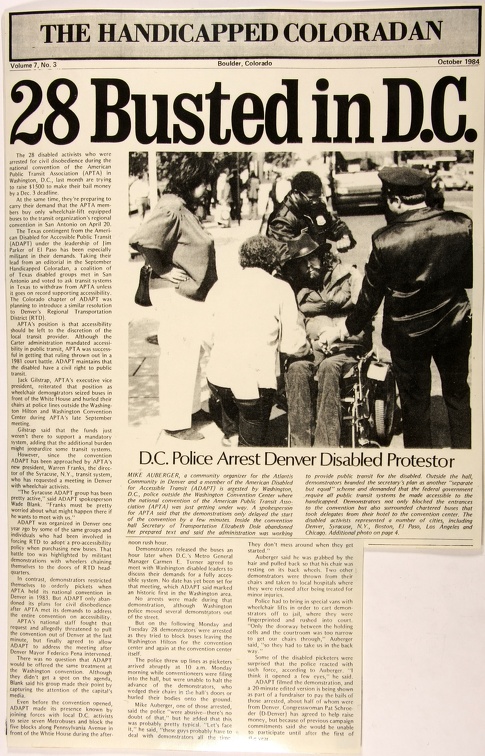 ADAPT (180)
ADAPT (180)
THE HANDICAPPED COLORADAN Volume 7, No. 3 Boulder, Colorado October 1984 PHOTO: A man in a leather brimmed hat, long hair beard and moustache down vest and jeans, seated in a motorized wheelchair (Mike Auberger), leans to his right as he is surrounded by abled bodied people. Back to the camera, a man plain clothes is partially in front of him, papers sticking out from his back pocket. A uniformed officer is also back to the camera and is holding Mike's arm which in front of Mike. A second uniformed officer is doing something behind Mike's back while a woman stands up on the sidewalk to his side watching with her hands on her hips. (She was an organizer with National Training and Information Center and was assisting with the Access Institute.) cation reads: D.C. Police Arrest Denver Disabled Protestor MIKE AUBERGER, a community organizer for the Atlantis Community in Denver and a member of the American Disabled for Accessible Transit (ADAPT) is arrested by Washington, D.C., police outside the Washington Convention Center where the national convention of the American Public Transit Association (APTA) was just getting under way. A spokesperson for APTA said that the demonstrations only delayed the start of the convention by a few minutes. Inside the convention hall Secretary of Transportation Elizabeth Dole abandoned her prepared text and said the administration was working to provide public transit for the disabled. Outside the hall, demonstrators branded the secretary's plan as another “separate but equal" scheme and demanded that the federal government require all public transit systems be made accessible to the handicapped. Demonstrators not only blocked the entrances to the convention but also surrounded chartered buses that took delegates from their hotel to the convention center. The disabled activists represented a number of cities, including Denver, Syracuse, N.Y., Boston, El Paso, Los Angeles and Chicago. Additional photo on page 4. 28 Busted in D.C. The 28 disabled activists who were arrested for civil disobedience during the national convention of the American Public Transit Association (APTA) in Washington, D.C., last month are trying to raise $1500 to make their bail money by a Dec. 3 deadline. At the same time, they're preparing to carry their demand that the APTA members buy only wheelchair-lift equipped buses to the transit organization's regional convention in San Antonio on April 20. The Texas contingent from the American Disabled for Accessible Public Transit (ADAPT) under the leadership of Jim Parker of El Paso has been especially militant in their demands. Taking their lead from an editorial in the September Handicapped Coloradan, a coalition of of Texas disabled groups met in San Antonio and voted to ask transit systems in Texas to withdraw from APTA unless it goes on record supporting accessibility. The Colorado chapter of ADAPT was planning to introduce a similar resolution to Denver’s Regional Transportation District (RTD). APTA's position is that accessibility should be left to the discretion of the local transit provider, Although the Carter administration mandated accessibility in public transit, APTA was successful in getting that ruling thrown out in a l98l court battle. ADAPT maintains that the disabled have a civil right to public transit. Jack Gilstrap, APTA's executive vice president, reiterated that position as wheelchair demonstrators seized buses in front of the White House and hurled their chairs at police lines outside the Washington Hilton and Washington Convention Center during APTA's late September meeting. Gilstrap said that the funds just weren't there to support a mandatory system, adding that the additional burden might jeopardize some transit systems. However, since the convention ADAPT has been approached by APTA's new president, Warren Franks, the director of the Syracuse, N.Y., transit system, who has requested a meeting in Denver with wheelchair activists. "The Syracuse ADAPT group has been pretty active," said ADAPT spokesperson Wade Blank. "Franks must be pretty worried about what might happen there if he wants to meet with us.“ ADAPT was organized in Denver one year ago by some of the same groups and individuals who had been involved in forcing RTD to adopt a pro-accessibility policy when purchasing new buses. That battle too was highlighted by militant demonstrations with wheelers chaining themselves to the doors of RTD headquarters. In contrast, demonstrators restricted themselves to orderly pickets when APTA held its national convention in Denver in 1983. But ADAPT only abandoned its plans for civil disobedience after APTA met its demands to address the entire convention on accessibility. APTA's national staff fought that request and allegedly threatened to pull the convention out of Denver at the last minute, but finally agreed to allow ADAPT to address the meeting after Denver Mayor Federico Pena intervened. There was no question that ADAPT would be offered the same treatment at the Washington convention. Although they didn't get a spot on the agenda Blank said his group made their point by capturing the attention of the capital's media. Even before the convention opened, ADAPT made its presence known by joining forces with local D.C. activists to seize seven Metrobuses and block the five blocks along Pennsylvania Avenue in front of the White House during the afternoon rush hour. Demonstrators released the buses an hour later when D.C.’s Metro General Manager Carmen E. Turner agreed to meet with Washington disabled leaders to discuss their demands for a fully accessible system. No date has yet been set for that meeting, which ADAPT said marked an historic first in the Washington area. No arrests were made during that demonstration, although Washington police moved several demonstrators out of the street. But on the following Monday and Tuesday 28 demonstrators were arrested as they tried to block buses leaving the Washington Hilton for the convention center and again at the convention center itself. The police threw up lines as picketers arrived but were unable to halt the advance of the demonstrators, who wedged their chairs in the hall's doors or hurled their bodies onto the ground. Mike Auberger, one of those arrested, said the police "were abusive -- there's no doubt of that," but he added that this was probably pretty typical. “Let's face it," he said, "these guys probably have to deal with demonstrators all the time." They don't mess around when they get started. Auberger said he was grabbed by the hair and pulled back so that his chair was resting on its back wheels. Two other demonstrators were thrown from their chairs and taken to local hospitals where they were released after being treated for minor injuries. Police had to bring in special vans with wheelchair lifts in order to cart demonstrators off to jail, where they were fingerprinted and rushed into court. "Only the doorway between the holding cells and the courtroom was too narrow to get our chairs through," Auberger said, "so they had to take us in the back way." Some of the disabled picketers were surprised that the police reacted with such force, according to Auberger. "l think it opened a few eyes," he said. ADAPT filmed the demonstration, and a 20-minute edited version is being shown as part of a fundraiser to pay the bails of those arrested, about half of whom were from Denver. Congresswoman Pat Schroeder (D-Denver) has agreed tn help raise money, but because of previous campaign commitments said she would be unable to participate until after the first of the year.![ADAPT (188) (5547 visits) Dallas Times Herald, Saturday Nov. 24, 1984
[Headline] Wheelchair activist adopt radical tacti... ADAPT (188)](_data/i/upload/2015/12/10/20151210170654-422fcd5a-la.jpg) ADAPT (188)
ADAPT (188)
Dallas Times Herald, Saturday Nov. 24, 1984 [Headline] Wheelchair activist adopt radical tactics Los Angeles Times WASHINGTON — It was a scene reminiscent of the 1960s civii rights demonstrations as angry protesters chanted slogans, picketed the White House and stopped traffic before they were finally dragged away by police. And the series of confrontations that ended with 27 arrests last month all seemed to come down to a similar central issue —- the right to sit on a bus, to have full access to public transportation. There was one striking difference, however. Unlike Rosa Parks and the black civil rights activists who battered down the Jim Crow barriers in the South, these protesters were in wheelchairs, and their goal was equal access for the physically handicapped. "It's a civil right to be able to ride public transportation," says Julia Haraksin, a wheelchair-bound Los Angeles resident who participated in the demonstrations. Organizations representing handicapped persons long have urged Washington to require that all new buses and rail systems built with funds from the Department of Transportation's Urban Mass Transportation Administration be equipped to accommodate handicapped riders. But Haraksin and other handicapped individuals are beginning to press the old arguments with more radical tactics. Frustrated by years of negotiating, lobbying in Washington, going through the courts and staging non-confrontational protests, some handicapped activists now are resorting to confrontations and civil disobedience. Thus, early in October, 100 members of a newly formed coalition called American Disabled for Accessible Public Transit confronted a national meeting of city transportation heads here, using the kind of civil disobedience tactics used 20 years earlier by Dr. Martin Luther King Jr. Protesters were arrested when they blocked entrances and buses of those attending the American Public Transit Association convention. “The strategy was to physically be a barrier because handicapped people have to face barriers all their lives," Wade Blank, a founder of Denver-based ADAPT, said. Calling the protests here “our Selma," leaders of ADAPT claimed a public relations victory and promised their struggle has only begun. They already are focusing their efforts on what they hope will be a larger demonstration at the next meeting of the American Public Transportation Association a year from now in Los Angeles. But their cause may be in for a tough battle. Their opposition comes from the Reagan administration, from many city governments and even from within the handicapped community. And as public attention focuses on the underlying budget choices involved, the opposition may swell with the addition of taxpayers concerned about the possible costs of a national full-access program. ADAPT argues a legal right to full access for the handicapped already exists. Federal law states Urban Mass Transportation Administration funds — which account for about 80 percent of the costs of the equipment in most municipal transportation systems —- cannot be spent on programs that discriminate against, or exclude, the handicapped. The law does not make clear, however, whether handicapped persons must be provided with access to regular bus lines or whether they can instead be provided with alternative transportation systems. Nor does it indicate who should make that decision. Current Department of Transportation policy, which is strongly supported by the American Public Transportation Association, allows each city to make its own decision on what type of transportation it will provide for the handicapped. This is in sharp contrast with Carter administration policy, which in 1979 interpreted federal regulations to mean full access. Members of ADAPT, opposing the separate-but-equal philosophy, argue that paratransit does not meet the needs of the handlcapped and is inherently discriminatory. “lt segregates the disabled people trom the able-bodied community," Mike Auberger, an organizer for ADAPT, said. Because paratransit requires advanced scheduling, sometimes weeks before a ride is needed, he said, “you have to schedule your life according to the transit system." Transit authorities, on the other hand, argue full access can be too expensive, given the low percentage of handicapped riders in many cities. Lift-fitted buses cost an estimated $8,000 to $10,000 more than regular buses. Furthermore, lift systems are often unreliable and time-consuming to operate and maintain, authorities add. In Denver, for example, the transportation district has spent $6.3 million to purchase or retrofit buses with lifts, 80 percent of which was paid for by the federal government, according to spokesman Gene Towne. Since it started mainline access in 1982, the district has spent close to $1 million in maintenance of the lifts and expects to spend an additional $900,000 this year. Yet only 12,000 of the district's 38 million riders use the lifts, according to Towne. ADAPT counters the issue is not cost but civil liberties. "In America, we have a way of hiding our prejudices with pragmatism," said Blank, a Presbyterian minister and veteran of the civil rights and anti-war movements of the 1960s who now supports handicapped activists. Across the country, cities are using a variety of approaches to the problems of providing mass transit for the handicapped. ln Los Angeles, mainline access is required by state law. Although 1,850 of the Southern California Rapid Transit District's 2,400 buses are fitted with wheelchair lifts, some local advocates charge that broken lifts, drivers who do not know how to use the equipment or refuse to do so and an overall lack of commitment to providing access limits the system. [Bottom of the page is torn so missing text is included in brackets, as it is just a guess.] In Seattle, 570 of 1,100 buses serve the handicapped, providing about 5,900 rides a month. [The] Municipality of Metropolitan Seattle also contracts with groups to supply paratransit [vans] and half-fare cab service, [providing] 8,400 rides a month. In Denver, 432 of the [city's] buses are lift- or ramp-[equipped] providing more than 1,00[0 rides] per month. The city also [uses] vans and small buses in a transit system that provides [x number of] rides a month. None of Chicago's 2,400 [mainline] buses is fitted with lifts. [Instead] the city provides 42 [paratransit] buses, which offer 12,000 [rides per] month.![ADAPT (92) (4852 visits) Denver Post Thurs., Sept., 14, 1978? or 9?
[Headline] One arrested during confrontation
Phot... ADAPT (92)](_data/i/upload/2016/05/10/20160510141647-da38723f-la.jpg) ADAPT (92)
ADAPT (92)
Denver Post Thurs., Sept., 14, 1978? or 9? [Headline] One arrested during confrontation Photo by Denver Post photographer [Kunn B*s*0?]: Two people in uniforms carry a woman along a corridor. One has her under her arms, the other by the legs, which are crossed. A man in a suit looks from a distance down the corridor. Caption reads: Demonstrator Patsy Castor is carried from RTD building. She was one of more than 20 ejected after refusing to [unreadable.] Handicapped Protesters Forcibly Ejected From RTD Offices By BRAD MARTISILS, Denver Post Staff Writer One man was arrested and more than 20 handicapped protesters, some wailing and yelling and others kicking and resisting, were ejected forcibly from RTD headquarters Wednesday afternoon after they refused to leave voluntarily. The single arrest was made after Jeff Franek, 24, or 1123 Adams St. [unreadable] struck and knocked down an RTD employee. Franek, who isn't handicapped, was booked on suspicion of assault and released on a $50 cash bond. The demonstrators were removed from the building by about eight Denver policemen assisted by ambulance crews from Denver General Hospital. The ambulance [unreadable] there to assist demonstrators confined to wheelchairs included paramedics trained to handle disabled persons. Police also arranged for [unreadable] ambulance cabs to provide transportation for the demonstrators desiring it. THE PROTESTERS had occupied the fifth floor of RTD offices at 1225 S. Colorado Blvd earlier Wednesday. lt was one of a number of demonstrations over the past few months aimed at pressing RTD officials to provide more service for handicapped persons on regular bus routes. Protesters said they had planned to stay in the offices for three days. But when RTD's Executive Director John Simpson met with them shortly after 5 pm he explained that the building was closing and that they couldn't stay. The protesters refused to meet with him in a downstairs conference room. SIMPSON WAS interrupted by catcalls several times as he tried lo speak to the protesters. "You're not leaving me many choices," he told them when they refused to leave. Bob Conrad, 29, of 750 Knox Court, acted as spokesman for the protesters. When Simpson tried to explain RTD's policies, Conrad said he had been hearing the same explanations for years. "John, you've been telling us the same crap for three years," Conrad said. "We are being denied our rights because we can't ride the buses." Conrad said his group wants to take advantage of regular bus service. But Simpson said such service simply doesn't work for the handicapped. He pointed to a program in St. Louis, in which lifts were installed on 157 buses. In a year's time, he said, only 1,000 rides were given to persons in wheelchairs, at a cost of $200 per ride. THE IMPEDIMENTS to travel for the handicapped aren't primarily with buses," Simpson said. "Studies have shown that inability to get over curbs, to get to the bus stop, and to travel from the bus are much more important factors." Simpson said RTD's service -- which is due to be expanded -- is a better alternative than putting lifts on all buses. He said RTD's service accommodated more than 45,000 trips for handicapped persons in 1977, at a cost of about $10 per trip. He said service to the homes of handicapped persons is being provided by 12 special HandyRide buses. He said 18 more lift-equipped buses soon will begin running on fixed, circular routes, once their lift mechanisms meet the standards of the Denver Commission on the Disabled. Finally, he said 10 more specially equipped buses will soon begin running between RTD Park and Ride areas and various college campuses and shopping centers, where many handicapped persons need transportation. THE HANDYRIDE service operates by subscription, meaning the potential riders must arrange with RTD for the buses to stop at their homes. The fares are the same as for regular bus service. Simpson said the subscription service is filled to capacity, serving 55 wheelchair users and 78 persons with other disabilities. He said there is a waiting list of persons wishing to take advantage of the service. Simpson said equipping RTD buses with lifts to accommodate persons in wheelchairs would cost $4 million. Annual operating costs would be more than $6.5 million, he said. However, the protesters didn't hear his facts and figures because they refused to meet Simpson in the conference room and then were ejected. SEVERAL OF the protesters struggled violently when they were ejected from the building. At least one, Patsy Castor, 18, was slightly injured. She was hauled from the building struggling violently with ambulance crews call to assist police officers. A few onlookers said attendants purposely dropped her outside the door. Others said she struggled so violently that they dropped her accidentally. Wade Blank, director of the Atlantis Community for the handicapped in Denver, said the group was prepared for everything but forceful ejection. "We've asked to be arrested," he said, "But the way things look, I don't think we even have the right to expect that."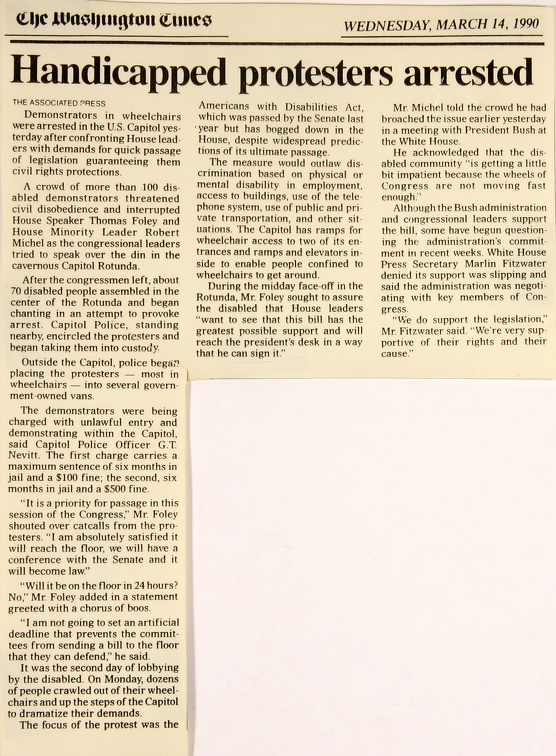 ADAPT (533)
ADAPT (533)
The Washington Times Wednesday, March 14, 1990 Handicapped protesters arrested The Associated Press Demonstrators in wheelchairs were arrested in the U.S. Capitol yesterday after confronting House leaders with demands for quick passage of legislation guaranteeing them civil rights protections. A crowd of more than 100 disabled demonstrators threatened civil disobedience and interrupted House Speaker Thomas Foley and House Minority Leader Robert Michel as the congressional leaders tried to speak over the din in the cavernous Capitol Rotunda. After the congressmen left, about 70 disabled people assembled in the center of the Rotunda and began chanting in an attempt to provoke arrest. Capitol Police, standing nearby, encircled the protesters and began taking them into custody. Outside the Capitol, police began placing the protesters - most in Wheelchairs - into several government owned vans. The demonstrators were being charged with unlawful entry and demonstrating within the Capitol, said Capitol Police Officer G.T. Nevitt. The first charge carries a maximum sentence of six months in jail and a $100 fine; the second, six months in jail and a $500 fine. “It is a priority for passage in this session of the Congress," Mr. Foley shouted over catcalls from the protesters. “l am absolutely satisfied it will reach the floor. we will have a conference with the Senate and it will become law." “Will it be on the floor in 24 hours? No," Mr Foley added in a statement greeted with a chorus of boos. “I am not going to set an artificial deadline that prevents the committees from sending a bill to the floor that they can defend," he said. It was the second day of lobbying by the disabled. On Monday, dozens of people crawled out of their wheelchairs and up the steps of the Capitol to dramatize their demands. The focus of the protest was the Americans with Disabilities Act, which was passed by the Senate last year but has bogged down in the House, despite widespread predictions of its ultimate passage. The measure would outlaw discrimination based on physical or mental disability in employment, access to buildings, use of the telephone system, use of public and private transportation, and other situations. The Capitol has ramps for wheelchair access to two of its entrances and ramps and elevators inside to enable people confined to wheelchairs to get around. During the midday face-off in the Rotunda, Mr. Foley sought to assure the disabled that House leaders “want to see that this bill has the greatest possible support and will reach the president's desk in a way that he can sign it." Mr. Michel told the crowd he had broached the issue earlier yesterday in a meeting with President Bush at the White House. He acknowledged that the disabled community “is getting a little bit impatient because the wheels of Congress are not moving fast enough." Although the Bush administration and congressional leaders support the bill, some have begun questioning the administration's commitment in recent weeks. White House Press Secretary Marlin Fitzwater denied its support was slipping and said the administration was negotiating with key members of Congress. "We do support the legislation," Mr Fitzwater said. “We‘re very supportive of their rights and their cause."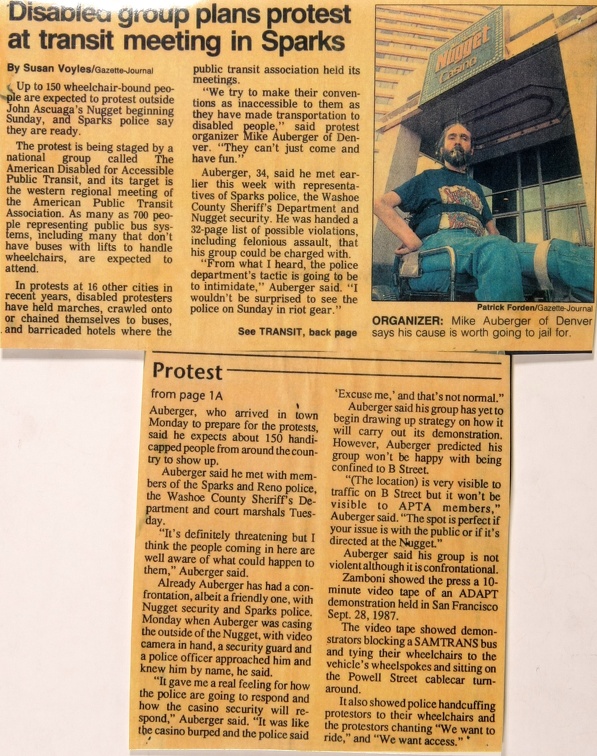 ADAPT (456)
ADAPT (456)
PHOTO by Patrick Forden/Gazette Journal; The photo is looking up at Mike Auberger in a non-ADAPT T-shirt and jeans, with a short beard and mustache, hands on his hips. His chair is somewhat visible and his left leg elevated. He is sitting in the doorway of a fancy Casino with a Nugget Casino sign over the door. Caption reads: ORGANIZER: Mike Auberger of Denver says his cause is worth going to jail for. TITLE: Disabled group plans protest at transit meeting in Sparks By Susan Voyles/Gazette-Journal Up to 150 wheelchair-bound people are expected to protest outside John Ascuaga’s Nugget beginning Sunday, and Sparks police say they are ready. The protest is being staged by a national group called The American Disabled for Accessible Public Transit, and its target is the western regional meeting of the American Public Transit Association. As many as 700 people representing public bus systems, including many that don’t have buses with lifts to handle wheelchairs, are expected to attend. In protests at 16 other cities in recent years, disabled protesters have held marches, crawled onto or chained themselves to buses, and barricaded hotels where the public transit association held its meetings. “We try to make their conventions as inaccessible to them as they have made transportation to disabled people ” said protest organizer Mike Auberger of Denver. “They can’t just come and have fun." Auberger, 34, said he met earlier this week with representatives of Sparks police, the Washoe County Sheriff’s Department and Nugget security. He was handed a 32-page list of possible violations, including felonious assault, that his group could be charged with. “From what I heard, the police department’s tactic is going to be to intimidate,” Auberger said. “I wouldn’t be surprised to see the police on Sunday in riot gear.” Auberger, who arrived in town Monday to prepare for the protests, said he expects about 150 handicapped people from around the country to show up. Auberger said he met with members of the Sparks and Reno police, the Washoe County Sheriff’s Department and court marshals Tuesday. “It’s definitely threatening but I think the people coming in here are well aware of what could happen to them,” Auberger said. Already Auberger has had a confrontation, albeit a friendly one, with Nugget security and Sparks police. Monday when Auberger was casing the outside of the Nugget, with video camera in hand, a security guard and a police officer approached him and knew him by name, he said. “It gave me a real feeling for how the police are going to respond and how the casino security will respond," Auberger said. “It was like the casino burped and the police said ‘Excuse me,’ and that’s not normal." Auberger said his group has yet to begin drawing up strategy on how it will carry out its demonstration. However, Auberger predicted his group won’t be happy with being confined to B Street. “(The location) is very visible to traffic on B Street but it won’t be visible to APTA members,” Auberger said. “The spot is perfect if your issue is with the public or if it's directed at the Nugget." Auberger said his group is not violent although it is confrontational. Zamboni showed the press a 10-minute video tape of an ADAPT demonstration held in San Francisco Sept. 28, 1987. The video tape showed demonstrators blocking a SAMTRANS bus and tying their wheelchairs to the vehicle's wheelspokes and sitting on the Powell Street cable-car tum-around. It also showed police handcuffing protestors to their wheelchairs and the protestors chanting "We want to ride,” and "We want access."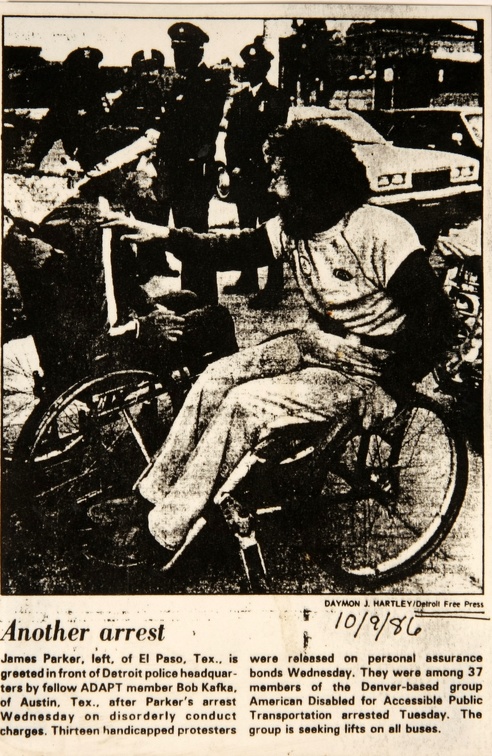 ADAPT (272)
ADAPT (272)
Detroit Free Press 10/9/86 PHOTO by Damon J. Hartley/Detroit Free Press: Two men in wheelchairs sit side by side but facing in opposite directions. One man, in a sports chair, who is dressed mostly in light colored clothes, has a bushy crop of dark hair and a mustache and beard (Bob Kafka). The other, in a more conventional manual chair without armrests, is dressed in dark clothes and has a headband and long hair and beard (Jim Parker). Bob has his inside arm up and his hand on Jim's shoulder. Behind them four uniformed police officers watch. Caption reads: Another Arrest James Parker, left, of El Paso, Tex., is greeted in front of Detroit police headquarters by fellow ADAPT member Bob Kafka, of Austin. Tex., after Parker’s arrest Wednesday on disorderly conduct charges. Thirteen handicapped protesters were released on personal assurance bonds Wednesday. They were among 37 members of the Denver-based group American Disabled for Accessible Public Transportation arrested Tuesday. The group is seeking lifts on all buses.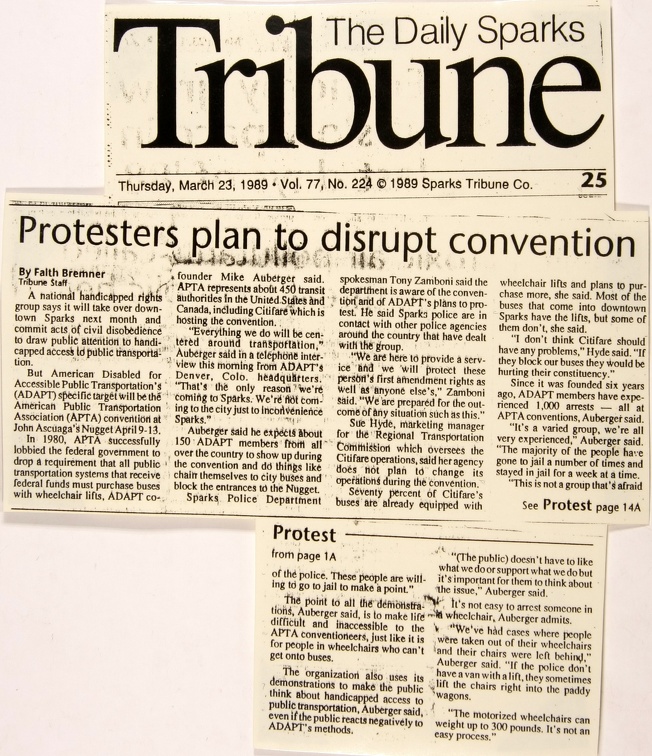 ADAPT (459)
ADAPT (459)
The Daily Sparks Tribune: Thursday, March 23, 1989 - Vol. 77. No. 224 @ 1989 Sparks Tribune Co [Headline] Protesters plan to disrupt convention By Faith Bremner Tribune Staff A national handicapped rights group says it will take over downtown Sparks next month and commit acts of civil disobedience to draw public attention to handicapped accessible public transportation. But American Disabled for Accessible Public Transportation's (ADAPT) specific target will be the American Public Transportation Association (APTA) convention at John Ascuaga's Nugget April 9-13. In 1980, APTA successfully lobbied the federal government to drop a requirement that all public transportation systems that receive federal funds must purchase buses with wheelchair lifts, ADAPT co-founder Mike Auberger said. APTA represents about 450 transit authorities in the United States and Canada, including Citifare which is hosting the convention. "Everything we do will be centered around transportation,” Auberger said in a telephone interview this morning from ADAPT's Denver, Colo. headquarters. “That's the only reason “we're coming to Sparks; We‘re not coming to the city just to inconvenience Sparks.” Auberger said he expected about 150 ADAPT members from all over the country to show up during the convention and do things like chain themselves to city buses and block the entrances to the Nugget. Sparks Police Department spokesman Tony Zamboni said the department is aware of the convention and of ADAPT's plans to protest. He said Sparks Police are in contact with other police agencies around the country that have dealt with the group. "We are here to provide a service and we will protect these person's first amendment rights as well as anyone else‘s," Zamboni said. "We are prepared for the outcome of any situation such as this.“ Sue Hyde, marketing manager for the Regional Transportation Commission which oversees the Citifare operations, said her agency does not plan to change its operations during the convention. Seventy percent of Citifare‘s buses are already equipped with wheelchair lifts and plans to purchase more, she said. Most of the buses that come into downtown Sparks have the lifts, but some of them don’t, she said. “I don't think Citifare should have any problems," Hyde said. "If they block our buses they would be hurting their constituency." Since it was founded six years ago, ADAPT members have experienced 1,000 arrests — all at APTA conventions, Auberger said. "It‘s a varied group, we're all very experienced." Auberger said. "The majority of the people have gone to jail a number of times and stayed in jail for a week at a time. "This is not a group that's afraid of the police. These people are willing to go to jail to make a point." The point to all the demonstrations, Auberger said, is to make life difficult and inaccessible to the APTA conventioneers, just like it is for people in wheelchairs who can't get onto buses. The organization also uses its demonstrations to make the public think about handicapped access to public transportation, Auberger said, even if the public reacts negatively to ADAPT's methods. "(The public) doesn't have to like what we do or support what we do but it‘s important for them to think about the issue,“ Auberger said. It‘s not easy to arrest someone in a wheelchair, Auberger admits. "We've had cases where people were taken out of their wheelchairs and their chairs were left behind" Auberger said. “If the police don't have a van with a lift, they sometimes lift the chairs right into the paddy wagons. "The motorized wheelchairs can weight up to 300 pounds. It's not an easy process."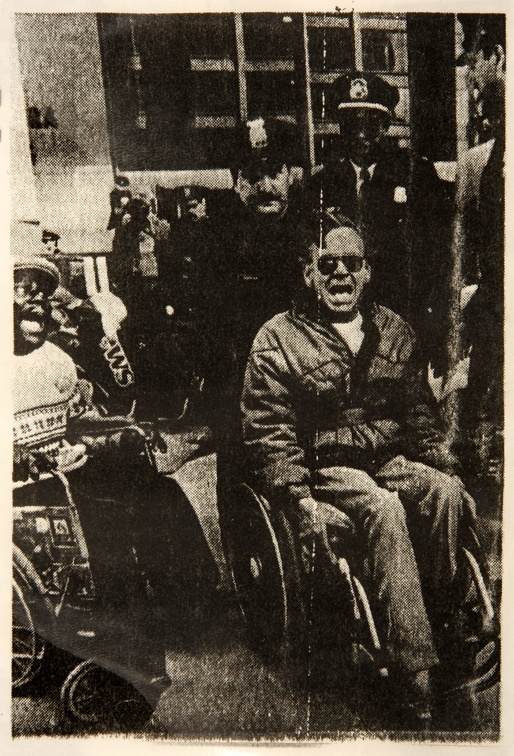 ADAPT (276)
ADAPT (276)
PHOTO by ?: A man in a manual, sports-type, wheelchair (Glenn Horton) has his mouth wide open chanting, and beside him another man in older manual chair (Bernard Baker) chants with him. Behind him two police officers look like they are taking Glenn away. A third officer faces Glenn and looks down at him. The dark police uniforms, cause Glenn to stand out, and his dark sunglasses give him a slightly crazed look. Behind this little group you can see other officers and a TV camera man by a downtown office building.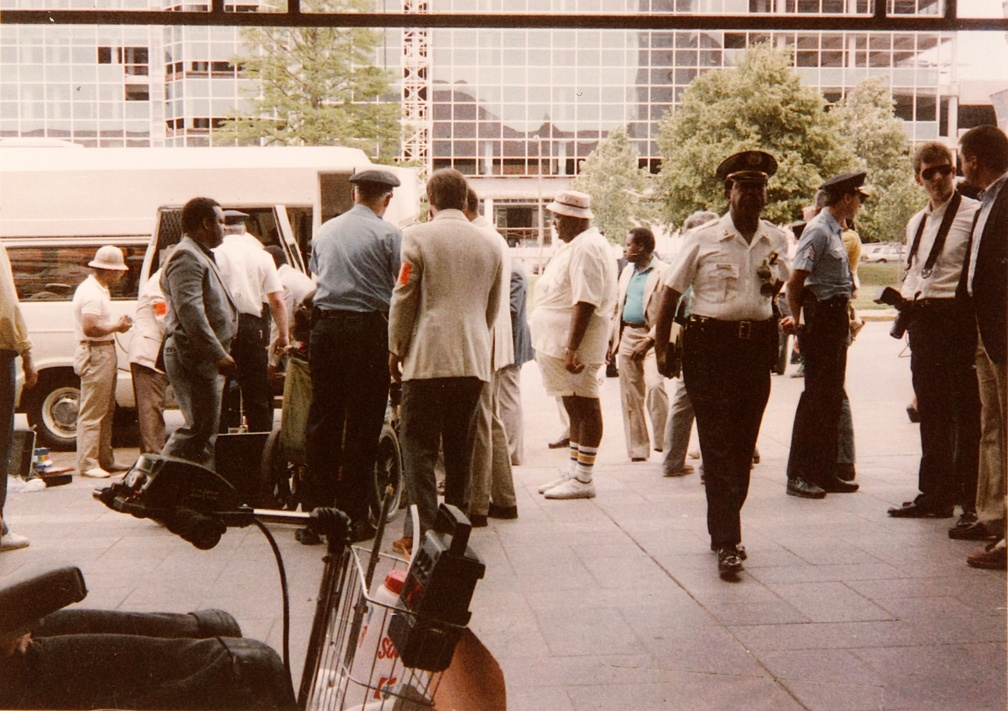 ADAPT (399)
ADAPT (399)
PHOTO: People stand around in small groups. In the forground is the front end of a scooter and someone's (Tommy Malone from KY) legs with knee pads. In the center an African American police officer walks toward the camera from outside into a covered area. To his side stands an African American man (Rev. Willie Smith) in white sneakers, socks, shorts and plain (non ADAPT) T-shirt and hat. He is watching a partially obscured group standing by a raised roof van, loading people in wheelchairs into it. In the background are large glass city buildings.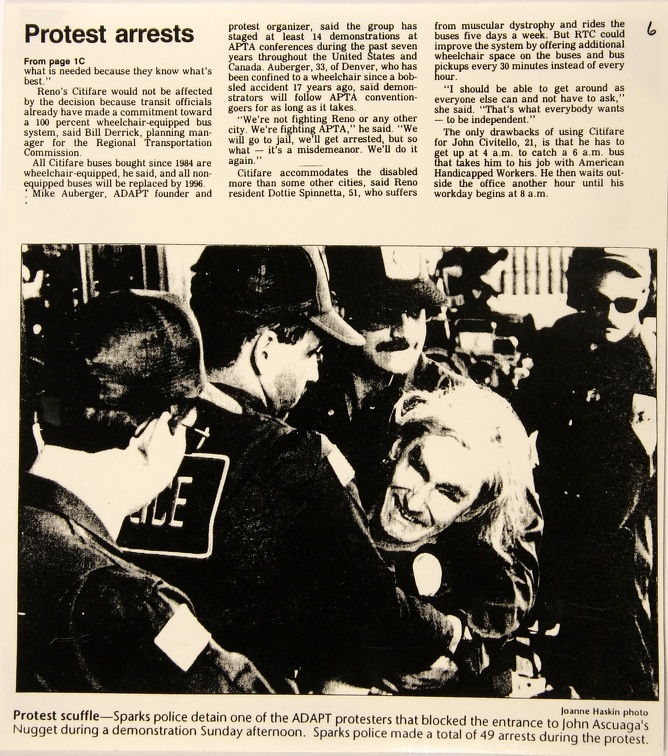 ADAPT (455)
ADAPT (455)
This is a continuation of the story on 461 and the complete text of the article is included there for ease of reading. Photo of Arthur Campbell being arrested.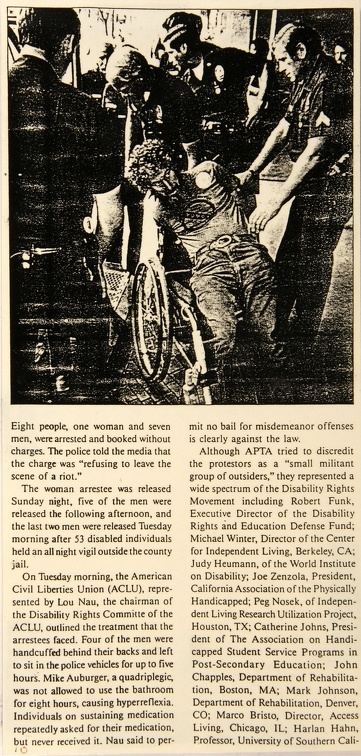 ADAPT (211)
ADAPT (211)
This article starts on ADAPT 217 and continues on ADAPT 210 where it ends before the end of the story. The text is included in 217 in its entirety for easier reading. Photo: A man, Bob Kafka, sitting awkwardly, almost falling out of his manual wheelchair, apparently handcuffed behind his back. His legs are falling under the chair, and he is surrounded by four or more police officers.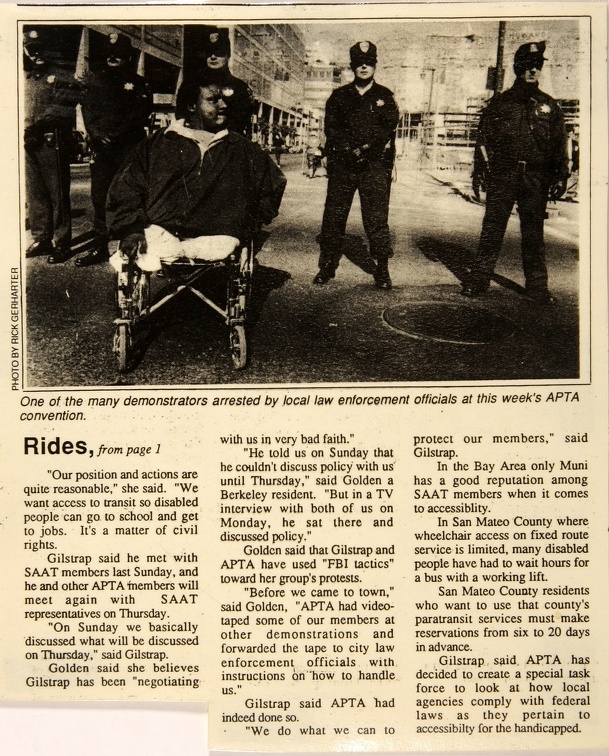 ADAPT (366)
ADAPT (366)
This is a continuation of the article in ADAPT 375 and the entire text of the story is included there for easier reading. Photo by Rick Gerharter: A heavyset double amputee in a manual wheelchair (Jerry Eubanks) sits looking sideways in the middle of a street. Behind him a line of five uniformed police officers stand in a row looking straight ahead, over his head. Caption reads: One of the many demonstrators arrested by local law enforcement officials at this week's APTA convention.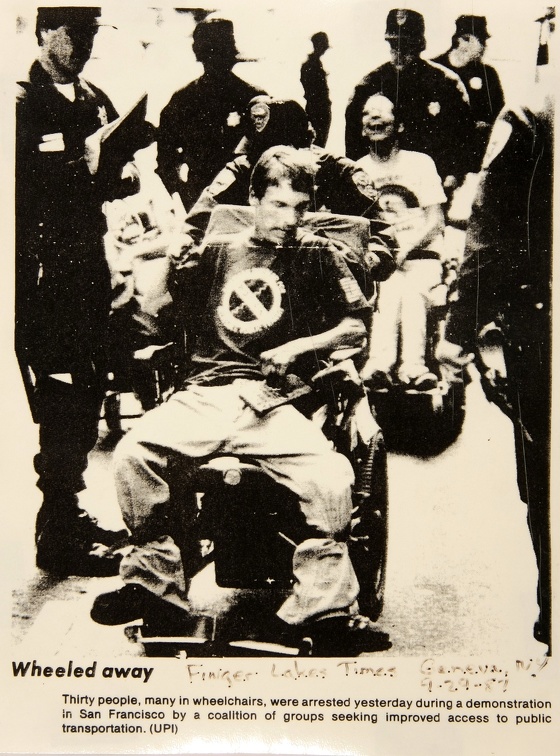 ADAPT (371)
ADAPT (371)
Fingerlakes Times, Geneva NY 9-29-87 PHOTO : Claude Holcomb, wearing a no-steps ADAPT logo T-shirt, sits strapped into his chair. He is looking down and pointing at his wooden letterboard. Uniformed police stand on either side and one is bent forward behind him pushing him. Behind them in a line is Greg Buchannan with another policeman holding his chair. Caption reads: Wheeled away. Thirty people, many in wheelchairs, were arrested yesterday during a demonstration in San Francisco by a coalition of `groups` seeking improved access to public transportation. (UPI)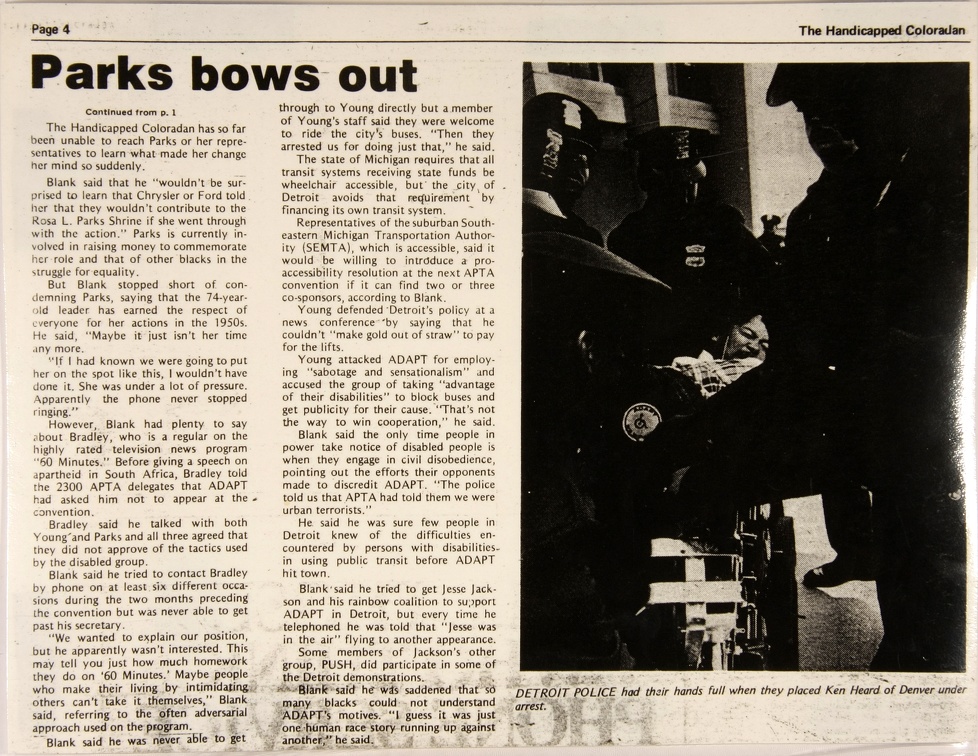 ADAPT (288)
ADAPT (288)
This story is a continuation of the first article in ADAPT 296. The text of the article is included there for easier reading. PHOTO: The dark figures of 3 Detroit police officers loom into the frame from all sides. Through a small hole between their arms you can see the face and chest of a man (Ken Heard) they are surrounding. Below their arms you can see the wheels and frame Ken's wheelchair. Caption reads: Detroit police had their hands full when they placed Ken Heard under arrest.